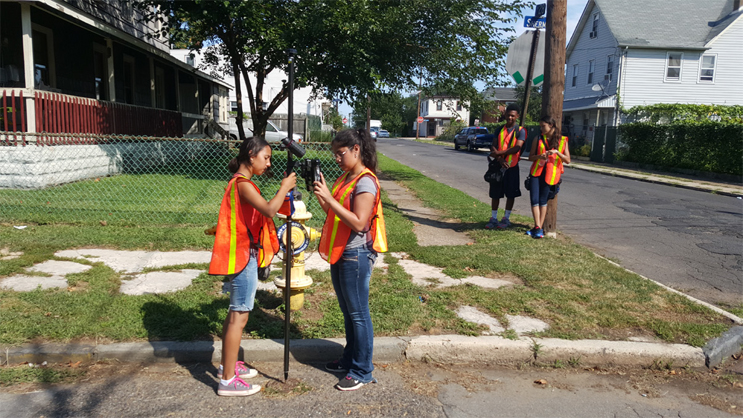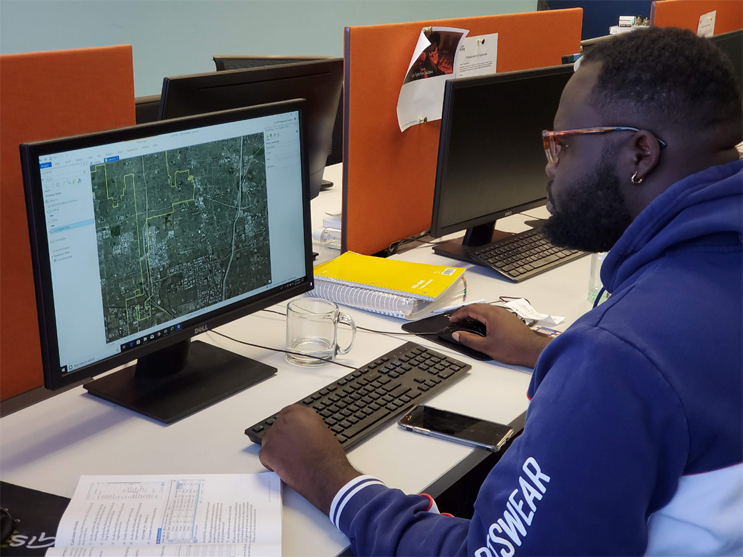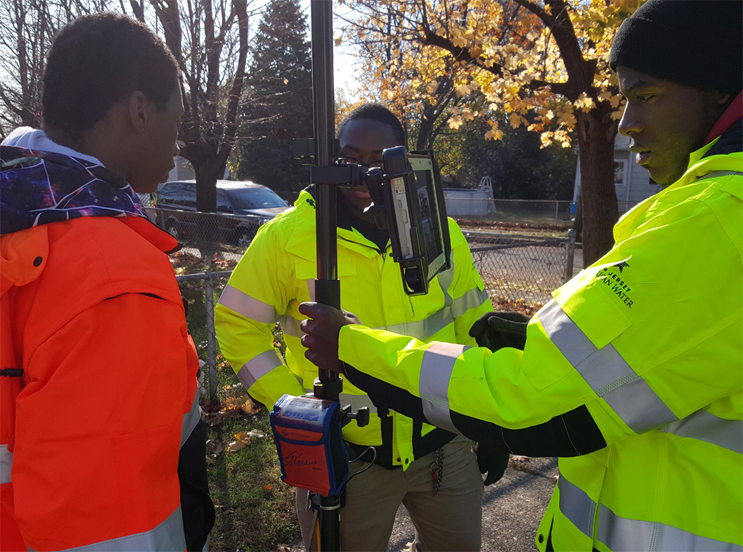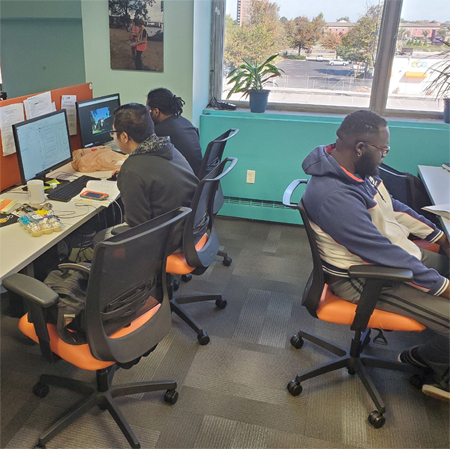Addressing The Utility Workforce Challenge With A Pipeline Of Opportunities For Youth
By Luis Olivieri, Bridgette McCauley, and Shelton Anderson

With training and development as a high priority for top talent, one nonprofit partners with a utility leader to uplift the next-generation workforce.
The water industry, like many others, is facing an enormous workforce development issue. Some of the most skilled and longest-tenured workers are aging out and leaving a knowledge gap for the incoming workforce. And with the COVID-19 economy pushing some workers into early retirement, it’s never been more timely (or important) for utilities to focus on new and innovative ways to identify and train the next-generation workforce.
Yet, for utilities specifically, this pivotal moment of workforce transformation brings great opportunity to diversify the industry’s workforce. Because of new technologies and innovations, frontline utility jobs are not as labor-intensive as they used to be, so companies have the ability to recruit people from a variety of backgrounds vs. the traditional labor workers that historically filled these positions — resulting in a greater, more inclusive pool of talent. But how can the utilities industry and your company specifically get started with recruiting (and retaining) talent to meet current and future needs?
1. Identify the right partner(s) to help develop an inclusive workforce development strategy.
Maintaining a dependable workforce is crucial in today’s world, and now, more than ever, inclusion and diversity must be top-of- mind. There are various programs and partnerships in each community that can help attract and recruit young talent to meet your organization’s current and future needs.
Organizations and employers of all industries are having important and challenging conversations about workforce development and how they can not only identify potential talent but also ensure that talent is representative and inclusive. Helping to facilitate this requires an early introduction of various career paths and possibilities to America’s youth, especially in essential and increasingly tech-driven industries like ours.
One highly successful partnership that is a model for creating opportunities, as well as a qualified pipeline of employment, is American Water, the largest and most geographically diverse U.S. publicly traded water and wastewater utility company, with Hopeworks, a social enterprise based in Camden, NJ, that uses technology, healing, and entrepreneurship to transform lives. Through this partnership, Hopeworks and American Water are able to provide real work experience to youth with state-of-the-art geographic information system (GIS) and global positioning satellite (GPS) technology and, in turn, provide a qualified pool of diverse applicants for in-demand jobs.

2. Introduce young professionals to pathways in the utility industry.
Utility jobs offer a career path toward a sustainable future, with fewer educational barriers than other fields. Unlike some public-sector jobs, a rewarding, lifelong position in the water and wastewater industry does not require a college degree. Companies need to ensure that there are meaningful and different pathways for young people that will lead to high-quality jobs and a supply of workers who have mastered the skills necessary to succeed.

American Water provides its customers with safe and reliable water and wastewater services. Its employees help make that happen. However, one of the major challenges facing the nation is the critical and unprecedented staff shortage in the water workforce that operates and maintains our essential drinking water and wastewater infrastructure. Workforce development is a core component of American Water’s strategy, and it regularly looks to identify opportunities to partner with nonprofits in the communities it serves, which is why New Jersey American Water partnered with Hopeworks. New Jersey American Water saw real potential in partnering with the organization, creating new possibilities to expand and enhance its current workforce development strategy while helping Camden-based youth develop valuable job skills.

The partnership began with New Jersey American Water engaging one or two Hopeworks youths as in-house interns, where they had exposure to GIS mapping and GPS, as well as day-to-day tasks. New Jersey American Water needed additional support on asset records, specifically legacy assets, in its Camden service area. The legacy asset component volume was so immense that Hopeworks was able to provide additional support to get the legacy information accurately updated in the systems. In addition, the interns were able to help support other needs such as main-break mapping, which impacts all aspects of the business, and getting that information accurately updated.
3. Identify opportunities to cultivating long-term talent.
 Investing in youth and identifying opportunities to develop their workforce skills with the potential for advancement will build a resilient and adaptable workforce ready to meet the challenges and opportunities of the water and wastewater industry. Developing the next generation of specialists requires engagement with youth to promote awareness of promising career opportunities in the industry. Partnering with an organization can help enlarge the pool of potential applicants for water industry careers that need to be filled now and in the coming years. Hopeworks and American Water continue to provide youth the opportunity to develop and understand the skills needed for a career in the water industry. One young woman’s story epitomizes the value that partnerships like this bring to the community while enabling the company to fulfill its mission of providing safe and reliable water and wastewater services.
Investing in youth and identifying opportunities to develop their workforce skills with the potential for advancement will build a resilient and adaptable workforce ready to meet the challenges and opportunities of the water and wastewater industry. Developing the next generation of specialists requires engagement with youth to promote awareness of promising career opportunities in the industry. Partnering with an organization can help enlarge the pool of potential applicants for water industry careers that need to be filled now and in the coming years. Hopeworks and American Water continue to provide youth the opportunity to develop and understand the skills needed for a career in the water industry. One young woman’s story epitomizes the value that partnerships like this bring to the community while enabling the company to fulfill its mission of providing safe and reliable water and wastewater services.
When the partnership began, Ashley Pena served as an intern with the tap imaging project, and since then, Hopeworks and New Jersey American Water have had the pleasure of witnessing and contributing to her professional growth. She first came to Hopeworks and began to nurture her skills in tech, then advanced into an internship with Hopeworks’ GIS department. During her internship, New Jersey American Water saw real potential in her and made an opening for her to work full-time in the Camden office. She is a prime example of why the partnership works. When there are opportunities to expand, training youth to be the best they can be inspires more young people to get involved.
The opportunity is now. American Water and Hopeworks expanded their partnership to include another state subsidiary, Tennessee American Water. This partnership continues to provide real-world work experience in one of the most in-demand, growing fields, while also benefiting customers. The partnership has resulted in several Hopeworks youth securing positions with New Jersey American Water after their internships, as well as creating a steady pipeline of jobs for Hopeworks graduates in the GIS field. As utility companies continue to develop their workforce development strategies, organizations like Hopeworks are ready to help with solutions and provide their expertise because they acknowledge that this is a game everyone can win and that there is so much need for workforce development with plenty of opportunity to do things differently.
About The Authors
 Luis Olivieri is the GIS Director at Hopeworks. For 16 years, he has worked as a professor in the areas of GIS, remote sensing, and GPS at various universities and colleges, including the University of Puerto Rico at Mayaguez, where he received his B.S. and M.S., and Rowan University. Luis worked as a researcher for the Puerto Rico Water Resources and Environment Research Institute and has worked as a consultant for the private sector as well as state and federal agencies.
Luis Olivieri is the GIS Director at Hopeworks. For 16 years, he has worked as a professor in the areas of GIS, remote sensing, and GPS at various universities and colleges, including the University of Puerto Rico at Mayaguez, where he received his B.S. and M.S., and Rowan University. Luis worked as a researcher for the Puerto Rico Water Resources and Environment Research Institute and has worked as a consultant for the private sector as well as state and federal agencies.
 Bridgette McCauley is a GIS Project Manager at New Jersey American Water. She has worked directly with the Hopeworks organization since July 2019. Bridgette graduated with a B.S. in Environmental Science from the State University of New York at Oneonta and worked for a series of non-profits before moving into the water/wastewater sector. She has been with New Jersey American Water since July 2015.
Bridgette McCauley is a GIS Project Manager at New Jersey American Water. She has worked directly with the Hopeworks organization since July 2019. Bridgette graduated with a B.S. in Environmental Science from the State University of New York at Oneonta and worked for a series of non-profits before moving into the water/wastewater sector. She has been with New Jersey American Water since July 2015.
 Shelton Anderson is the GIS Manager at New Jersey American Water. Shelton has been with American Water for six years and during this time has held various GIS roles in New Jersey, Virginia, and Maryland. Prior to American Water, he worked for three years in GIS at Hamilton Township MUA in Atlantic County, NJ.
Shelton Anderson is the GIS Manager at New Jersey American Water. Shelton has been with American Water for six years and during this time has held various GIS roles in New Jersey, Virginia, and Maryland. Prior to American Water, he worked for three years in GIS at Hamilton Township MUA in Atlantic County, NJ.
